Blue Active Pathway
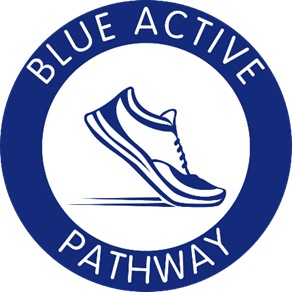
Pupils in our Blue Active Pathway have high levels of sensory processing needs and require a proactive, multisensory curriculum to support their regulation and engagement.
The Blue Active Curriculum promotes pupils’ engagement for learning, focussing on the areas of exploration, anticipation, realisation, initiation and persistence.
Pupils within this pathway are developing functional communication. For most, this will be at a social partner stage. This means that they rely on adults to support and/or facilitate their communication in order to meet their wants and needs.
The Blue Active Curriculum is a Topic/Theme/Music Genre Based Curriculum with each termly scheme of work providing multi-sensory experiences that are relevant, meaningful, exciting, and multicultural, reflecting life in modern Britain. Each scheme of work is clearly structured and sequenced to ensure that pupils experience a wide range of multisensory learning opportunities and experiences designed to widen their worlds and increase their cultural capital.
The subject areas across all phases are “contexts for learning” allowing pupils to progress within their Personalised Learning Plans. These have been written with the support of our therapy colleagues and link seamlessly with their Education, Health and Care Plans.
Within the Blue Active Pathway, teachers complete a context for learning plan for each day ensuring that every pupil is accessing the right specialist approaches and interventions and are making ipsative progress within their Personalised Learning Plans, R levels, Routes for Learning and the five areas of Engagement.
Below are some of the Specialist Approaches and Interventions that are used within the Blue Active Pathway:
- SCERTS
- Engagement Model
- Sensology
- Body Beats
- Intensive Interaction
- TEACCH
- Identiplay
- Sensory Circuits
- Massage Stories
- Interoception Curriculum
We ensure that we offer a progressive and ambitious curriculum, one that is rich and varied for all of our pupils within the Blue Active Pathway throughout their school journey. Each phase has a clear and distinct offer, providing immersive opportunities for them linked to an age-appropriate topic, theme or genre.
![]()
Within the Primary Phase, pupils follow a termly, multi-sensory scheme of work linked to a motivating, termly topic and an appropriate and meaningful text/s.
Please see the Topic Grid below for The Primary Phase:
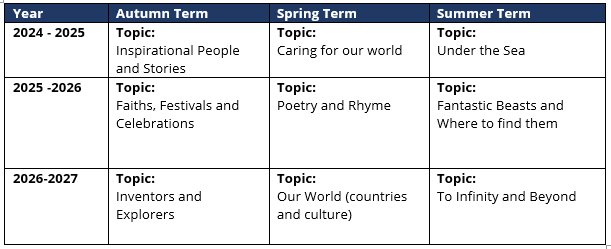
The following subject areas are included within each pupils’ timetable to ensure a wide breadth of experience:
- Literacy
- Numeracy and Problem Solving
- World Studies (RE, Geography, History, Identity and Belonging)
- Science and ICT
- Expressive Arts (Art, Drama, Dance, Music)
- PE and Movement
- RSHE and Wellbeing (Yoga, relaxation, mindfulness, sensology)
- Community
Within the Blue Active Pathway, we promote and prioritise our pupils’ emotional regulation, communication, sensory needs and independence through every aspect of their school day.
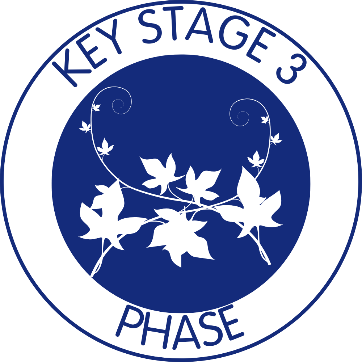
Within the Key Stage 3 Phase, pupils follow a termly multi-sensory scheme of work linked to an age appropriate and ambitious termly Topic and meaningful key text.
Please see the below Topic Grid for The Key Stage 3 phase:

The following subject areas are included within each pupil’s timetable to ensure a wide breadth of experience:
- Literacy
- Numeracy and Problem Solving
- World Studies (including RE, Geography, History, Identity and Belonging)
- Science and ICT
- Expressive Arts (Art, Drama, Dance, Music)
- PE and Movement
- RSHE and Wellbeing (Yoga, relaxation, mindfulness, sensology)
- Community and Careers Education
Within the Blue Active Pathway, we promote and prioritise our pupil’s sensory and emotional regulation, communication and independence through every aspect of their school day.
In addition to these subject areas, pupils within Key Stage three also start their Arts Award accreditation, facilitated by the Expressive Arts Team. The Arts Award takes our pupils on an artistic journey as they explore the arts and culture all around them, investigate different art forms, research artists, and share their discoveries with others. As well as developing their knowledge and understanding of the arts, the Arts Award boosts our pupils’ creativity, curiosity, confidence and communication skills.
Every pupil within Key Stage 3 also has a Passport of Experiences. This documents and celebrates the variety of experiences and opportunities within and outside Riverside School that pupils may not ordinarily access.
For example:
- Attending a Theatre or Opera Performance
- Experiencing an Art Exhibition
- Toasting Marshmallows during a Camping Experience
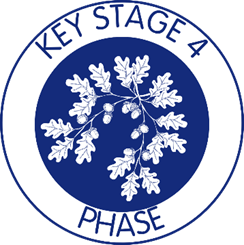
Within the Key stage 4 phase, pupils follow a termly multi-sensory scheme of work linked to each termly Theme based on current and relevant age-appropriate content.
Please see the below Theme Grid for The Key Stage 4 Phase:
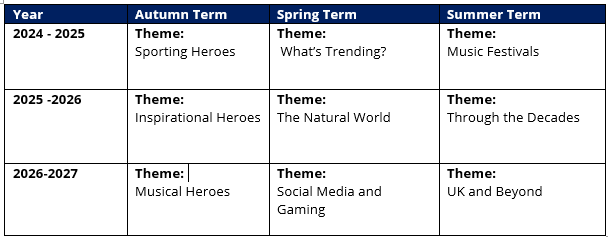
The following subject areas are included within each pupil’s timetable to ensure we are widening our pupil’s worlds and preparing them for adulthood and life beyond Riverside school:
- Literacy and Numeracy (weaved through all subjects)
- Arts and Culture
- Participation/Employability Skills (including being actively involved in Enterprise Initiatives)
- Physical Education
- Community Inclusion
- Independent Living
- Health and Wellbeing
We continue to promote and prioritise our pupils’ sensory and emotional regulation, communication and independence through every aspect of their day (including outside in the community) within Key Stage 4.
The following Attitudes, Skills and Knowledge are a key focus for pupils within this phase:
- Interoception and Self Awareness
- Interpersonal/Social skills
- Domestic Skills
- Personal Hygiene Routines
- Leisure and Self-Directed Interests/ Hobbies
- Health and Safety within the Community (Local and Wider)
Within Key stage 4 pupils in the Blue Active Pathway begin their accreditation journey and will complete a variety of carefully selected AQA accreditations. These are focussed on areas that will widen their world and give them more control within it. There is an increased focus on developing lifelong independence preparing them for adulthood and life beyond Riverside school.
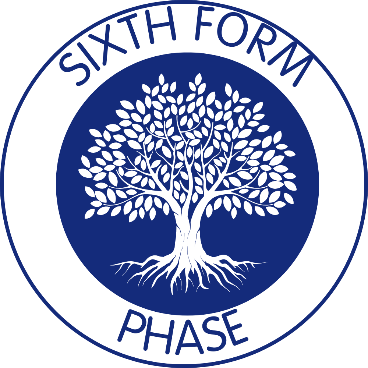
Within our 6th Form, pupils follow a termly multi-sensory scheme of work linked to a diverse collection of Music, enabling them to be fully immersed in the culture, identity and heritage of each genre.
Each Genre will be supported by our Expressive Arts Specialists to expand our pupils’ experiences and further widen their interests and worlds.
Please see the below Musical Genre Grid for 6th Form:

The following subject areas are included within each pupil’s timetable to ensure we are widening our pupil’s worlds and preparing them for adulthood and life beyond Riverside school:
- Literacy and Numeracy (weaved through all subjects)
- Arts and Culture
- Community Inclusion
- Independent Living
- Health and Wellbeing
- Participation/Employability (Community and Careers Education including being actively involved in Enterprise Initiatives)
We continue to promote and prioritise our pupil’s sensory and emotional regulation, communication and independence through every aspect of their day (including outside in the community) within 6th Form.
All pupils in 6th form will select an Option Subject from a choice of:
- Horticulture
- Sport and Leisure
- Health, Beauty and Wellbeing
- Hospitality and Catering
- Construction
- Citizenship
- Expressive Arts
Pupils will be supported to choose an Option Subject based on their own interests and families are invited into an Options Event to support their young person in making their meaningful choice.
Pupils will complete AQA unit awards linked to their chosen Option Subject adding to their Accreditation Portfolio.
Families, pupils and professionals work together to establish dreams and aspirations for the future to support successful transition from Riverside School.
Keeping in touch with our families and Alumni is incredibly important as it provides us with key information regarding our pupil’s successes and ways in which we can develop our curriculum offer further. We are never complacent and continue to reflect and evolve, meeting the ever-changing needs of our pupil population.
